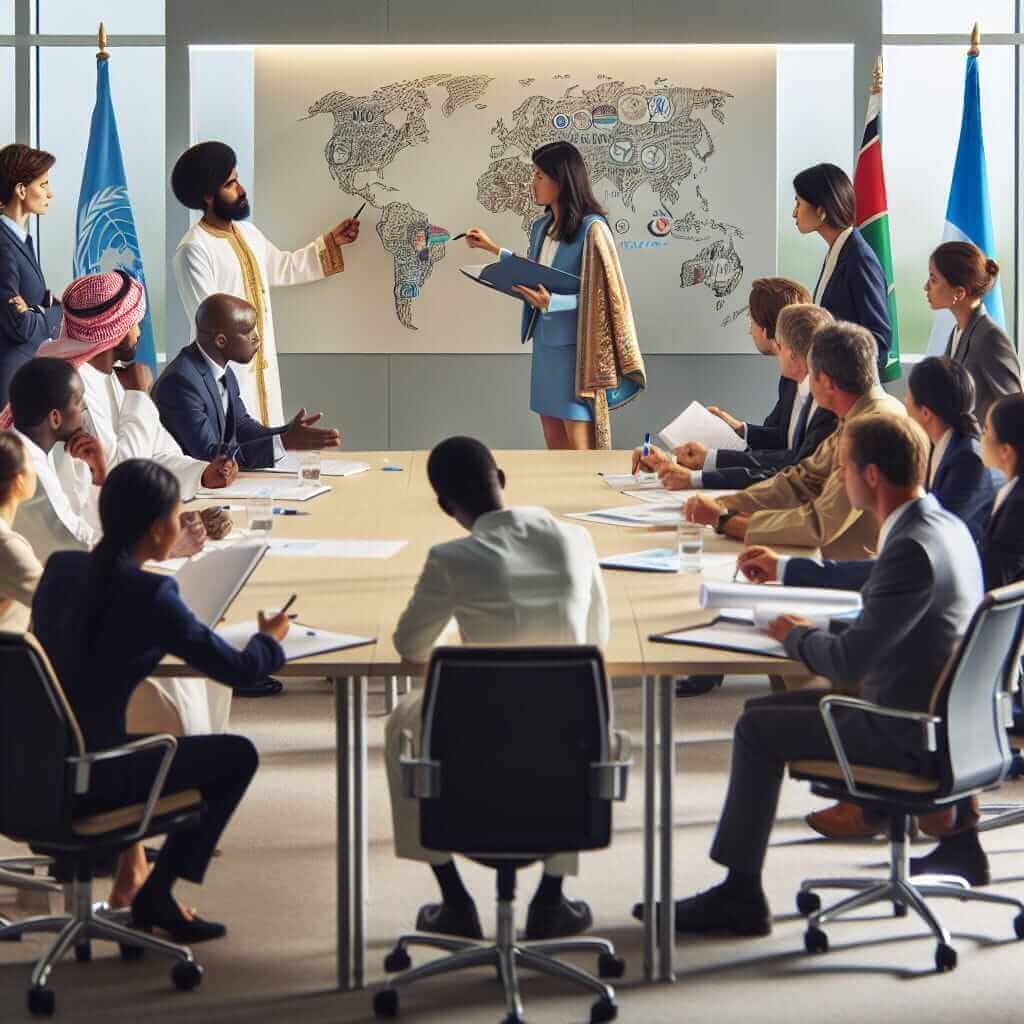The IELTS Reading Test is a crucial component of the IELTS examination, assessing a candidate’s ability to read and comprehend English texts. Given its importance, candidates should familiarize themselves with a variety of topics, including global peacekeeping – a subject that often appears in reading passages due to its relevance and breadth. This article provides an in-depth reading passage tailored to the theme “Role of International Organizations in Global Peacekeeping,” along with related IELTS-style questions and comprehensive explanations.
Reading Passage: Role of International Organizations in Global Peacekeeping
International organizations play a critical role in maintaining global peace and security. They strive to prevent conflicts, mediate disputes, and support post-conflict recovery. Among these organizations, the United Nations (UN) stands out as a premier body dedicated to peacekeeping efforts. Established in 1945, the UN has intervened in numerous global hotspots, deploying peacekeepers to monitor ceasefires and ensure the protection of civilians.
In addition to the UN, regional organizations such as the European Union (EU), the African Union (AU), and the Organization of American States (OAS) contribute significantly to peacekeeping missions. These bodies bring an understanding of regional dynamics that is essential for effective conflict resolution. For instance, the AU has been instrumental in addressing conflicts in Africa, providing troops for missions in Somalia, Sudan, and Mali.
Another essential role of international organizations is to offer platforms for dialogue and negotiation. The International Court of Justice (ICJ) and the United Nations Security Council (UNSC) are pivotal in this regard. They provide forums for states to resolve their differences through legal and diplomatic channels rather than armed conflict.
Moreover, international organizations support post-conflict reconstruction, helping war-torn societies to rebuild. They invest in critical infrastructure, promote good governance, and support the establishment of the rule of law. For example, the UN Development Programme (UNDP) works in various post-conflict regions to promote sustainable development and prevent the recurrence of violence.
Despite their significant contributions, international organizations face numerous challenges, including limited resources, political constraints, and complex conflict environments. Nonetheless, their continuous efforts remain indispensable in the quest for global peace and stability. The collaboration among various international and regional organizations ensures a comprehensive and coordinated approach to peacekeeping.

IELTS Reading Questions
Multiple Choice Questions
-
What is the primary objective of international organizations in global peacekeeping?
- A. Promoting economic growth
- B. Preventing conflicts and supporting post-conflict recovery
- C. Enhancing cultural exchanges
- D. Regulating international trade
-
Which organization is highlighted as the premier body for global peacekeeping?
- A. African Union
- B. European Union
- C. United Nations
- D. Organization of American States
Identifying Information (True/False/Not Given)
-
The International Court of Justice helps states resolve differences through armed conflict.
- A. True
- B. False
- C. Not Given
-
The African Union provides troops for UN missions in Europe.
- A. True
- B. False
- C. Not Given
Matching Information
Match each international organization with its peacekeeping contribution.
- United Nations (UN)
- African Union (AU)
- International Court of Justice (ICJ)
- UN Development Programme (UNDP)
A. Provides legal forums for dispute resolution
B. Intervenes in global hotspots
C. Supports post-conflict sustainable development
D. Addresses conflicts in Africa
Sentence Completion
- The UN Development Programme promotes sustainable development to _____.
Answer Key and Explanations
-
B. Preventing conflicts and supporting post-conflict recovery
Explanation: The passage explicitly states that international organizations work to prevent conflicts and support post-conflict recovery. -
C. United Nations
Explanation: The passage describes the UN as the premier body dedicated to peacekeeping efforts. -
B. False
Explanation: The International Court of Justice helps states resolve differences through legal and diplomatic channels, not armed conflict. -
B. False
Explanation: The passage mentions the AU provides troops for missions in Africa, not Europe. -
B. Intervenes in global hotspots
-
D. Addresses conflicts in Africa
-
A. Provides legal forums for dispute resolution
-
C. Supports post-conflict sustainable development
-
prevent the recurrence of violence
Explanation: The passage states the UNDP promotes sustainable development to prevent the recurrence of violence.
Common Mistakes in Answering
Students often misinterpret questions about specific organizations due to the overlap in their functions. Carefully differentiating the roles and contributions of each organization helps in answering accurately.
Key Vocabulary
- Peacekeeping (noun) /ˈpiːskiːpɪŋ/: The process of maintaining peace, especially through international military and diplomatic efforts.
- Ceasefire (noun) /ˈsiːsfaɪər/: A temporary suspension of fighting, typically one that is officially declared.
- Mediation (noun) /ˌmiːdiˈeɪʃən/: Intervention in a dispute to resolve it.
- Post-conflict (adjective) /ˌpəʊstˈkɒnflɪkt/: Following the end of a conflict.
- Sustainable development (noun) /səˈsteɪnəbl dɪˈvɛləpmənt/: Economic development that is conducted without depletion of natural resources.
Grammatical Structures to Note
- Relative Clauses: “among these organizations that intervene…”
- Complex Sentences: “Despite their significant contributions, international organizations face numerous challenges…”
- Present Participle Clauses: “…providing troops for missions in Somalia…”
Tips for a High IELTS Reading Score
- Practice Regularly: Consistent practice with various reading passages strengthens comprehension skills.
- Expand Vocabulary: Enhancing your vocabulary equips you to understand complex texts better.
- Time Management: Practicing under timed conditions helps improve your speed and accuracy.
- Understand Question Types: Familiarizing yourself with the format and types of IELTS reading questions is crucial for efficient answering.
By engaging with diverse topics and practicing regularly, candidates can work towards achieving high scores in the IELTS Reading Test. Happy studying!